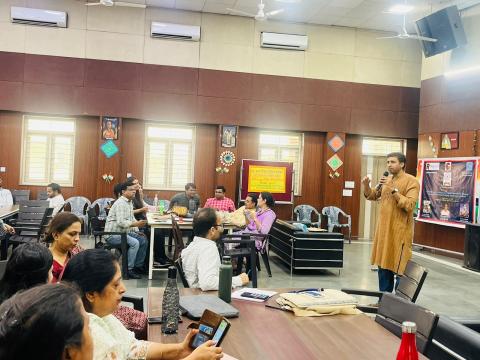
Navigating the Shift: Preserving the Professional Community of Teachers
Most of the schools in North India are observing summer vacation at this point in time. This is also the time when teachers undergo large-scale Teachers Training. Two important developments in the last couple of years have significantly changed the nature of teacher training. One is the COVID-19 pandemic, which made online the default option during the pandemic period, and the new education policy, which emphasizes shifting teacher training to the online mode. In just a few years, a significant shift can be seen, with a large number of teacher trainings now being conducted online.
Given economic prudence, the future appears to be in online teacher training. Both central and state governments have already created massive infrastructure to further accelerate the process of online teacher training. Various courses on relevant issues are already available on the Digital Infrastructure for Knowledge Sharing (DIKSHA). The features it offers are really attractive, as it gives teachers the choice to self-pace their learning from the comfort of their homes.
I have attended a couple of courses where the content was presented in both synchronous and asynchronous modes. The content offered through this platform is good, as are the resource persons. After completing at least a dozen of such online modules on various topics, spending hundreds of hours on them, I do not remember the name of a single person with whom I attended these courses. The idea of a professional community among teachers is at stake.
Over the years, teachers have worked in isolation, and it's during teacher training opportunities that they used to come out of their schools to meet teachers from other schools and resource persons from other institutions. Often, the interaction during lunch facilitated a collective identity of professionals. These were the opportunities where they could share their challenges, opportunities, and articulate their common concerns. Teachers, as part of the professional community, are already marginalized, and the meager space where they used to meet teachers from other schools is disappearing quickly. The lack of such structured space where they could collaborate in person will not only harm their professional identity but also marginalize them in terms of the benefits they enjoy as employees; they lose a collective voice.
To control and regulate a large group of people, the primary principle is to isolate them. The online phenomenon is effectively doing that. Of course, one can argue that in online interactions, we meet people and interact with them, but the chances of developing a proper professional community solely through the online mode are bleak. The online space is beneficial only in continuation of offline meetings. Online mode alone cannot facilitate the development of a professional community. When compulsory training opportunities are available from the comfort of one's house in the online mode, why should one care for the professional community?
A professional community for teachers is essential for several reasons. Firstly, it promotes collaboration and the exchange of ideas, allowing teachers to learn from each other's experiences and expertise. Secondly, it provides a support network where teachers can seek advice, share resources, and discuss challenges they encounter in their classrooms. Thirdly, it promotes professional development by offering opportunities for ongoing learning and training. Additionally, a professional community helps to establish standards and best practices within the teaching profession, ultimately improving the quality of education for students. Such a community enhances teacher effectiveness, job satisfaction, and the overall education ecosystem.
Next time you consider all the benefits attached to online training and opt for it, remember it's like cutting the branch of the tree you're sitting on. I anticipate that the entire teacher training program will be shifted to the online mode. However, if teachers want their professional community to survive and thrive, they will have to fight for offline space. The answer to this problem doesn't lie in either/or; rather, we need both offline and online spaces to engage with one another, and teacher training opportunities create such a space.
- Log in to post comments
